Marine Litter Education
Ansje Löhr has a Master’s degree in Marine Biology (University of Groningen, NL) and a PhD degree in Ecotoxicology (Vrije Universiteit Amsterdam, NL). She is an assistant professor at the Faculty of Science at the Open University of the Netherlands. Her teaching and research activities are within the research theme 'Plastic environmental pollution' covering aspects of (marine) biology, (eco)toxicology, environmental science, integrated water management and learning for sustainable development. She is the project leader of the Massive Open Online Course on Marine litter which is developed in close cooperation with the United Nations Environment Programme (UNEP) and the Global Partnership on Marine Litter (GPML). Besides she is involved in (international) projects on competence based e-learning. The Soegijapranata Catholic University (Semarang, Indonesia), is one of the important research partners in the research theme Plastic environmental pollution.
Ad Ragas (1964) studied biology and obtained his PhD at the Radboud University in Nijmegen, the Netherlands. He currently holds a position as a full professor in Environmental Natural Sciences at the Open University in Heerlen (the Netherlands), and as an associate professor in Nijmegen. His main expertise is the modelling of human and ecological risks of chemicals, including (micro)plastics. Within this domain, his focus is on quantifying and assessing uncertainty. He played an active role in European research projects like NoMiracle and PHARMAS, and currently participates in i-PiE and MEDUWA; two large European research projects on the environmental risks of pharmaceuticals. He coordinates the MSc programme in Environmental Sciences at the Open University and teaches several academic courses on risk assessment, GIS and statistics. He chairs the Dutch scientific advisory committee on quality standards for air and water, and is a member of the working group on mixture assessment of the European Food & Safety Authority (EFSA).
Dr. F.G.A.J. (Frank) Van Belleghem is an environmental toxicologist and an assistant professor at the Faculty Science of the Open University of the Netherlands. His teaching activities are in the field of biology, biochemistry, (environmental) toxicology and environmental sciences. He has been involved in several research projects at Hasselt University (Belgium) on the molecular and cellular aspects of toxicity and on the effects of environmental stress on regeneration and stem cell dynamics of the flatworms Schmidtea mediterranea and Macrostomum lignano. His area of expertise covers toxicity of environmental pollutants including nanoparticles and microplastics, oxidative stress, carcinogenesis, neurotoxicity, regeneration and electron- and fluorescence microscopy.
Education and research
For several years, researchers from the faculty of Science have been involved in projects such as the Clean Maas Limburg project, and collaborating with research partners in Indonesia into the causes and effects of plastic pollution and possible solutions.
Train the trainer sessions to monitor plastic pollution worldwide
In the summer of 2019 the Faculty of Science, in close cooperation with UN Environment Programme, developed a Training for Trainers on monitoring plastic pollution based on new Guidelines for the Monitoring and Assessment of Plastic Litter in the Ocean. The development took place in the context of the many years of collaboration between the Science department and the UN Environment Programme to tackle the problem of plastic pollution worldwide.
About the design of the training course
The participants will be trained in the field to use the right methods to collect high quality data on plastic pollution. This data is necessary to support policy questions and to provide answers to plastic pollution issues.
About the relevance of the training
Developer and trainer of the training course Ansje Löhr: 'It is very important to collect good data worldwide about the extent of plastic pollution and to use the right methods to gather data. It's great as the Open University to contribute to capacity building worldwide in this way'. It is planned that the training will also be given in other parts of the world.
Kenya and Indonesia first to be addressed
The training was organised in Kenya in August 2019 together with WIOMSA - the Western Indian Ocean Marine Science Association and the Kenya Marine and Fisheries Research Institute. Representatives from nine WIOMSA countries participated in Kenya.
In September 2019 the training was given in Indonesia and organised together with COBSEA – the Coordinating Body on the Seas of East Asia; the Global Partnership on Marine Litter, the Global Programme of Action for the Protection of the Marine Environment from Land-based Activities and co-hosted by the Regional Capacity Center on Clean Seas (RC3S) and the Ministry of Environment and Forestry of Indonesia. In Indonesia, representatives from eight COBESA countries took part.
Trainers from seven countries were involved in providing the training.
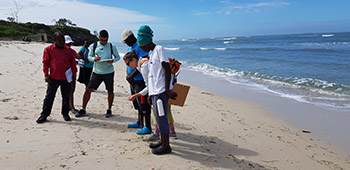
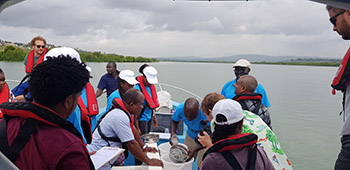
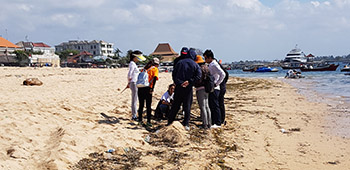
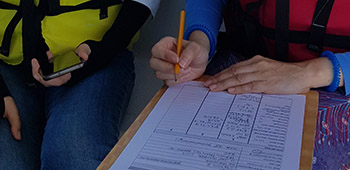
Current MSc projects
Moving towards a circular economy to prevent plastic marine litter leakages into the ocean
An analysis of the current plastic footprint, waste management, and plastic stewardship practices within the fast food sector in the city of Semarang.
Thesis committee:
Dr. Ansje Löhr - first OU supervisor
Professor Dr. Ad Ragas - OU assessor
Advising roles:
Prof. Dr. Harold Krikke - OU
Prof. Dr. Budi Widianarko (Soegijapranata Catholic University)
Inneke Hantoro, MSc (Soegijapranata Catholic University)
Environmental impact of stabilizing layers beneath artificial turfs.
Thesis committee:
At the Open Universiteit:
Dr. A.J. Löhr - first OU supervisor
Prof. dr. A.M.J. Ragas - OU assessor
External supervisor at RIVM:
Dr. ir. A.J. Verschoor
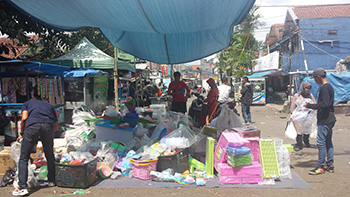
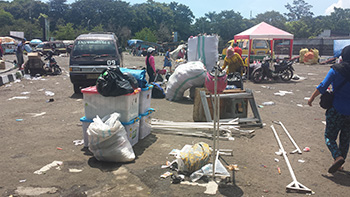
Commercial waste management and closing the plastics supply chain loop to prevent plastic marine litter in Indonesia
An analysis of the current state of the commercial waste management system and incentives for businesses to close the plastic supply chain loop in order to prevent leakage of plastic into the ocean in the city of Semarang.
- Faculty of Science | Open University
- Soegijapranata Catholic University, Indonesia
Milieueffecten van kunstgrasvelden
- Faculty of Science | Open University
- Rijks Instituut voor Volksgezondheid en Milieu (RIVM) – National Institute for Public Health and the Environment
